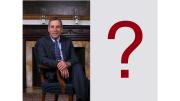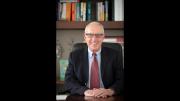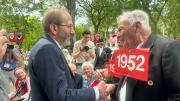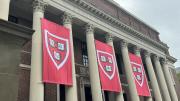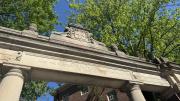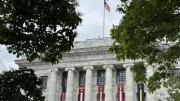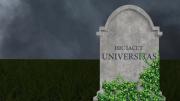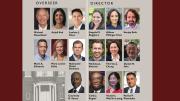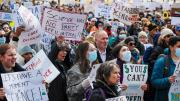Now that President Lawrence S. Bacow has announced his plan to step down at the end of the next academic year, by June 30, 2023, how will the University go about soliciting candidates to succeed him? Formally, the Harvard Corporation elects the president—the newcomer will be the thirtieth to hold the office—with the consent of the Board of Overseers. Much work goes into the decision. A look back five years gives a sense of what lies immediately ahead.
In June 2017, when Drew Gilpin Faust disclosed her intention to step down, she was nearing the end of her tenth year in office, the Harvard Campaign was proceeding toward its scheduled conclusion in 2018, and the Corporation’s senior fellow, William F. Lee, who would organize and lead the search, had been in that role since 2014 (and as a member of the Board of Overseers, had previously served on the 2006-2007 search committee that chose Faust). He addressed the 2017 search on the day of her announcement, pointing then to the expertise of Corporation members who had experience as past presidents of Duke, Princeton, and Tufts, and noting that the presidential transition would be a subject of the governing board’s summer retreat.
This year, the situation is somewhat different. The University community—notably including its leadership—is emerging from the rigors of coping with the pandemic. There was no expected end date to the administration tied to a capital campaign (which will very likely loom large on the next president’s agenda). And the Corporation itself is in transition. Lee, who was elected a fellow in 2010, concludes his service on June 30, and so will be uninvolved in the new search. Penny Pritzker becomes senior fellow July 1. A former Overseer, she joined the Corporation in mid 2018, after the search that resulted in Bacow’s appointment concluded. (It may be helpful that new Corporation member Tracy Palandjian, who begins July 1, was a member of the 2017-2018 presidential search committee.)
Those details aside, there is an established structure for searches—though it may be refined under new leadership, and in an era of pervasive electronic communications and Zoom meetings. In coming weeks, expect steps roughly like these.
•The search committee. On June 21, 2017, a week after Faust’s announcement, Lee told the Harvard Gazette that the search committee would consist of the Corporation members other than President Faust, and three Overseers. The latter three were the Overseers’ president, the vice chair of the executive committee, and another appointee. (Precedent suggests that in the 2022 search, Paul Choi and Leslie Tolbert, the Overseer leaders for the coming academic year, are likely to serve on the search committee, plus a third representative to be named.)
Lee also outlined means of outreach: formal faculty and student advisory committees; direct outreach by search-committee members to groups of faculty and staff members, students, and alumni, to gather perspectives on Harvard’s strengths and needs, and “what they would like to see in a new president”; direct communication to the entire Harvard community to solicit advice and nominations; and confidential conversations within Harvard and beyond to gain views on the University and potential candidates.
•External outreach. On July 11, 2017, Lee emailed the community, soliciting members’ views on:
the principal challenges and opportunities facing Harvard and higher education, and a new president’s priorities;
the qualities and experiences most important in the next president; and
nominations of individuals who warrant serious consideration as candidates.
He also announced that there would be three advisory committees—of faculty, staff, and students—drawn from across the University. These were consequential assignments: two members of the faculty advisory group, Claudine Gay and Bridget Terry Long, were subsequently appointed deans (of the Faculty of Arts and Sciences and the Graduate School of Education, respectively); and members of the staff advisory group have since been appointed vice president and general counsel, and executive vice president (Diane Lopez and Meredith Weenick).
With the search committee in place, advisory committees being populated, and outreach to the broad Harvard community begun, the search got under way in earnest. Similar steps seem likely today, if not necessarily on the same timeline.
•Framing the search—and its evolution. Finally, it is worth noting that a productive search is dynamic: those who conduct it really do learn from what they hear. Lee’s July 2017 message described the position this way:
[W]e will be seeking a person of high intellectual distinction, with proven qualities of leadership, a devotion to excellence in education and research, a capacity to guide a complex institution through times of change, a commitment to advance progress and collaboration across a wide span of academic domains, and a dedication to the ideals and values central to a community of learning.
During the search, against the background of a highly partisan political environment and widening attacks on and skepticism about the value of higher education, those rather anodyne terms evolved somewhat in an unexpected direction. By the time Bacow’s appointment was announced on February 11, 2018, Lee told a news conference that the search had come to focus on three characteristics judged most important for the next University president:
“broad and deep experience with the many, many challenging issues confronting universities today”;
the ability to see clearly “the huge opportunities before us in education, in research, and in serving the world broadly”; and
someone “who also clearly sees and is ready to confront the great challenges facing us at a moment when the value of higher education is being questioned, at a moment when the fundamental truth of fact-based inquiry is being questioned and called into doubt.”
And Lee said, “We wanted someone who could hit the ground running, because neither we nor higher education have time to spare.”
The concern about external context echoed repeatedly during the news conference. According to Lee, Bacow as a potential presidential candidate in 2017 similarly cited the critical moment for higher education in general and Harvard in particular—an important reason he agreed to be considered.
So it will be interesting in 2022 to see how this search is described at the outset, presumably in coming weeks—and how it proceeds into the autumn and winter of the new academic year.
